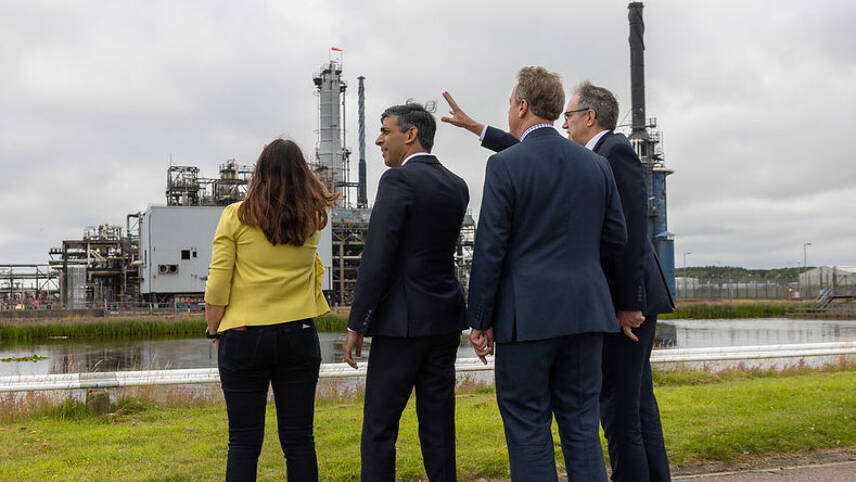Register for free and continue reading
Join our growing army of changemakers and get unlimited access to our premium content

Pictured: Ministerial visit at a gas plant in Aberdeen. Image: 10 Downing Street, CC BY-NC-ND 2.0. https://www.flickr.com/photos/number10gov/53083037737/
The UK Government is hosting an energy-security-themed summit in London today (2 August). Following on from meetings with energy workers and companies in Scotland earlier this week, the summit will convene senior executives from energy majors that will jointly announce plans to invest £100bn in energy in Britain.
Investments will be made in oil and gas extraction; energy generation; distribution and storage networks and next-gen innovations.
edie has asked the Government for clarity on which technologies will be supported by the investment and will update this article if and when further details are provided.
Only Shell and SSE have, so far, outlined this information. Shell has pledged at least three-quarters of its £20bn+ investment in the UK energy system through to 2033 to low-carbon products and services.
SSE is foreseeing investment of up to £40bn through to the 2031/32 financial year, with up to £18bn going to low-carbon technologies between 2021/22 and 2027.
Other spending commitments include £18bn from BP, £16bn from National Grid and £13bn from EDF.
edie has also asked the Government for details on how much of the funding touted today is newly announced.
Energy Security and Net-Zero Secretary Grant Shapps said: “Energy industry leaders can see that this Government will back home-grown, secure energy – whether that’s renewables, our revival in nuclear, or our support for our vital oil and gas industry in the North Sea.”
But earlier this week, the Renewable Energy and Clean Technology Association said the UK’s attractiveness to clean energy investors is dropping. The Association is pushing for the UK’s response to subsidy packages in markets like the US and EU. It also wants to see the Electricity Generator Levy scrapped.
Also this week, MPs on the Science, Innovation and Technology Committee accused the Government of using a “wishlist” rather than a “strategic plan” to plot the expansion of the UK’s nuclear sector.
Protests for the energy transition
Beyond the investment announcements from industry players, the summit will be used for the Government to showcase its recent interventions designed to end protests at sites owned by energy companies. These protests are often carried out to highlight the climate impact of the sector.
The Public Order Act comes into effect this July and will criminalise many forms of non-violent protest. It include specific powers to arrest and charge those involved in protests at energy sites. It also sets out measures to make unauthorized access to these sites more challenging.
The Government is touting these interventions as a means of protecting energy security and shielding workers.
The Act has proven unpopular in and beyond environmentalist circles. Organisations including Amnesty International, Liberty and even the UN have expressed concerns about the UK’s potential undermining of the civil right to protest peacefully.
Shapps has been a vocal opponent of protests on environmental grounds. He recently drew criticism for writing to Labour leader Kier Starmer, asking him to foot the bill for cosmetic damage done to his Department’s building by Just Stop Oil protestors.
Related article: Chris Skidmore requests emergency debate on Rishi Sunak’s North Sea oil and gas licencing round


Please login or Register to leave a comment.